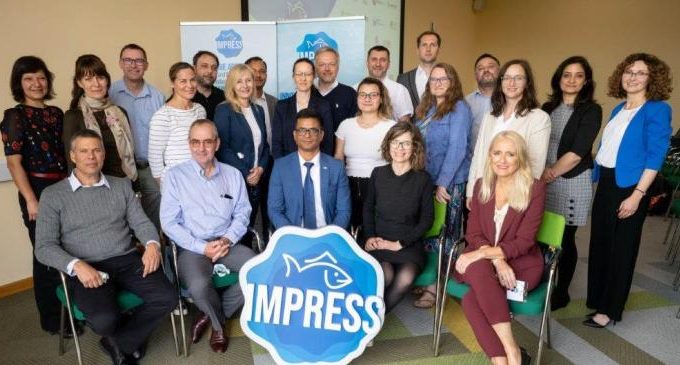IMPRESS: An EU Project building zero-waste, sustainable aquatic food value chains

IMPRESS is an industry driven project, based on sound science and centred around the EU Bioeconomy and Blue Growth strategies, striving to promote sustainable and zero-waste production and consumption. The four year project, co-funded by Horizon Europe officially began earlier this summer and brings together a multidisciplinary 14-member consortium of academic and research institutes, business associations, non-profit organisations and SMEs from seven countries. The partners will work together to address critical sustainability challenges faced by the marine and freshwater sectors, spanning from sea to shelf.
Led by Teagasc, the Irish Agriculture and Food Development Authority and a renowned research institute with expertise in sustainable food production and innovative processing techniques, the project will develop tangible solutions for the advancement of marine and freshwater bio-based economies in Europe, leveraging the underutilised marine and freshwater low trophic species.
“The IMPRESS project presents an unprecedented opportunity to drive sustainable practices and create value across the marine and freshwater sector, while addressing pressing environmental and societal challenges,” says project coordinator, Professor Brijesh Tiwari from Teagasc.
A unique zero waste value proposition
In order to meet the growing demand for aquatic food in the face of overfishing, and growing concern about waste production and environmental damage, innovative solutions that address the entire value chain are necessary. This also means going beyond theory to unlock opportunities that entice the business community to adopt more circularity and zero-waste approaches as well as educate consumers to adopt new eating habits. To do so the project will dive into two important areas:
1. The potential of underutilised and low trophic species;
2. Solid and liquid waste streams from fish processing.
IMPRESS will unlock the potential of low trophic species (which are those at the bottom of the food chain) like roach, sprat and lumpfish to create new food products and non-food products (biopesticides, biofertilizers, fish feed). IMPRESS will go even further to enhance the zero-waste approach by utilising waste water streams and solid by-products of commercial processing to extract high value ingredients and test the potential of these nutrient-rich waters to support duckweed and microalgae growth. Conventional extraction methods along with emerging technologies will be studied to enhance the extraction process while increasing the yield and quality of isolated compounds (proteins, glycogen, PUFA-rich oil).The project will also develop and pilot biopolymer blends and composites for producing compostable polymer films for food packaging applications and coatings to increase shelf life.
A market driven approach
New products will be developed after extensive mapping of existing ranges, market trends and regulations but will also use input from producers, processors and consumers starting with moderated brainstorming sessions and focus groups. A variety of methods and protocols will be used to extract and assess metabolites from low trophic species and extensive microbiological and chemical characterisation will be carried out for those intended for food application. High value ingredients will then be used for fish feed formulation, while micro-algae/duckweed will be integrated into vegan-fish like products to enhance flavour and reduce salt content. At least six low trophic species will be used to create new ready-to-eat fish products. To help products reach the market, the project will create circular business models that both support industry while addressing environmental and social responsibility.
Connecting with consumers
Changing consumers’ behaviours and attitudes won’t happen without understanding their needs and concerns which is why a pan-EU survey will be conducted to gather the perspectives and preferences of thousands of consumers regarding sustainable marine and freshwater products with the results being used to develop new products.
IMPRESS is just beginning its journey, and you can expect to see the project showcased at events all over Europe. Partners will host innovation workshops, present at academic conferences, industry fairs, and exhibitions but they will also lead cooking classes. Stay tuned for updates on the exciting progress of IMPRESS as it paves the way for sustainable, waste-free value chains in the marine and freshwater sectors. By promoting the introduction of new low trophic species from fresh and marine waters, employing energy-efficient processing techniques, and demonstrating circular and sustainably interlinked value chains, IMPRESS aims to maximise value creation with a zero-waste approach.

































